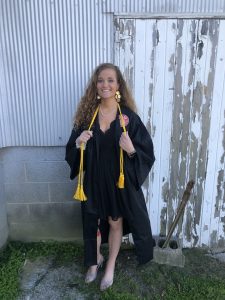Not sure whether teaching is the career path you want to take? Here’s why Illinois State University’s School of Communication teaching assistantships will help you gain professional experience, no matter what field you ultimately enter.
The School of Communication (COM) is committed to excellence in teaching and the intellectual growth of its students, which serves as the main initiative to offer students undergraduate and graduate teaching assistantships (UTA/GTA). Teaching assistants in Communication can expect ongoing instructional training and support from faculty and staff who believe their students play a vital role in intellectual growth by upholding their commitments within the core curriculum.
Teaching experience for UTAs not only offers professional experiences, but gives students the courage and conviction to continue their education in graduate school and deepen their overall impact after graduation. Jennifer Ehresman, a public relations major and graduating senior, began her UTA experience in fall 2019 under the supervision of Tom Lamonica, who led the COM 178 class. She continued her experience for the same class this spring with Dr. Becky Hayes.
“With Tom, he really pushed me out of my comfort zone. I was tasked with teaching a lesson on organizational identity. It was intimidating as public speaking isn’t my favorite thing,” Ehresman said. “Yet, I grew in confidence and poise as I became comfortable speaking in front of the lecture hall. My time with Becky was cut a little short, but she has handled the crisis phenomenally. I have learned a lot from her resiliency and adaptability. She taught me (through email) how to voice-over a PowerPoint.”
Looking ahead, Ehresman knew she didn’t necessarily want to teach but hopes to someday “work for a university to help students reach their potentials, perhaps as an advisor or an academic coordinator for student-athletes.”
Ehresman now has big plans for the fall 2020 semester. She will begin graduate school at Illinois State University in the college student personnel administration (CSPA) program and will be forever grateful for her experiences as a UTA that brought her to this new journey.
“I think a UTA experience offers an invaluable experience to anyone no matter their career goals. I learned the value of mentorship as I learned from Becky and Tom, but also as I was able to be a mentor to students,” Ehresman said. “Several students asked me to get coffee and talk about life and their goals. It was rewarding to be able to offer advice, especially since I had just made some of the ‘big’ decisions myself. I also gained good planning skills and professionalism in this class. I became innovative as I had to decide how to teach the class on identity.”
The experience for GTAs provides more opportunity to continue strengthening their teaching and leadership skills by placing them in front of the class. The GTAs are expected to participate in professional development seminars and peer mentor programs, where they learn classroom and grading responsibilities, course communication and policies, syllabi expectations, office etiquette, and more.
“The graduate faculty in COM has been really helpful in preparing me for teaching college courses,” said Nhung Vu, a spring 2020 graduate. “I came into this program with absolutely no teaching experience, and Dr. (Cheri) Simonds and Dr. John Hooker made sure that I was prepared to teach after a week of intensive training. They are very confident in our ability to teach and they have many years of experience in training new GTAs. I am still amazed by how prepared I felt when I walked into my first COM 110 class.”
When looking back at her experience as a GTA, Vu expressed her gratitude for getting to interact and develop deep connections with her students.
“They made me realize that there is still so much that I don’t know, and, hopefully, I can provide my students with useful tools for them to go out there and communicate their brilliant ideas with others. Working with these students made me realize how privileged I am to be in an educational environment where there’s a constant exchange of ideas and knowledge,” Vu said.
However, when it came to planning a future of her own, Vu didn’t always see herself as an instructor, but she realized her passion for education soon after becoming a GTA. Vu has recently committed to Penn State University’s doctoral program, where she will continue her education in the fall 2020 semester.
“Having the opportunity to gain some experience in teaching at ISU made this transition to the Ph.D. program less nerve-racking. I can focus more on doing research and getting used to the workload rather than on acquiring new skills for teaching,” Vu said. “Going through this master’s program helped me realize my passion for teaching and doing research. Therefore, after completing my Ph.D. program, I plan to stay in academia and continue to work with college students.”
The School of Communication recognizes the level of leadership GTAs bring to the graduate program, and, as a result, students are offered financial support that covers their tuition as well as additional monthly stipends. “Without this GTA position, I wouldn’t have been able to pursue my master’s degree. Having my tuition taken care of that covered my expenses was the deciding factor for me when I considered getting a master’s degree,” said Vu.
Whether a student wants to follow dreams of becoming an instructor or has no idea what the future holds, TA opportunities for undergraduates or graduates are very valuable. Being a TA allows students to explore their passions, learn their strengths and weaknesses, and obtain constant support and vital feedback from experienced professors all while helping ease the financial burden of attending school.
To learn more about undergraduate and graduate teaching assistantships in the School of Communication, visit the School of Communication website.



